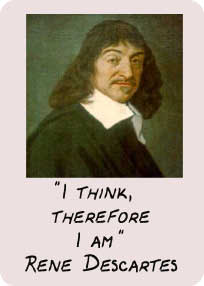WHO IS DESCARTES?
DESCARTES' DOUBT
René
Descartes has been called as the “Father of Modern Philosophy”. His philosophy
is still studied at the
present time. He was born in the city which is now called “Descartes” in
France, in 1596. He is best known for his philosophical statement “Cogito ergo
sum” which means “I think therefore I am”. In this writing, I will try to
explain what he means by this expression.
Descartes’s
philosophical goal was to find the absolute certainty. To achieve absolute certainty, Descartes only accepts the things he could verify with his
mind as true. He started doubting everything and saw that there are very few things he could be sure about. Descartes’s
starting point was subjective. His attitude was skeptical. He used the method
of doubt while he is searching for certain knowledge. He questions
how he can be sure that he is sitting by the fire, holding a piece of paper. He
can be dreaming or being deceived by a demon. After all, he comes to the conclusion
that even if he dreams or a demon deceives him, there is something dreaming or
being deceived. There is something indubitable. He must exist in order to be
deceived by a demon. He must exist to doubt from things. Doubting is a mental
activity and it requires an “I” to practice the activity. As long as he thinks,
he exists. He concluded that he must exist because he is thinking. Although he
is being deceived or he is dreaming, there is something thinking. At that
point, Descartes becomes sure that “I” exists. So, he said that “I think
therefore I am.”


Hiç yorum yok:
Yorum Gönder